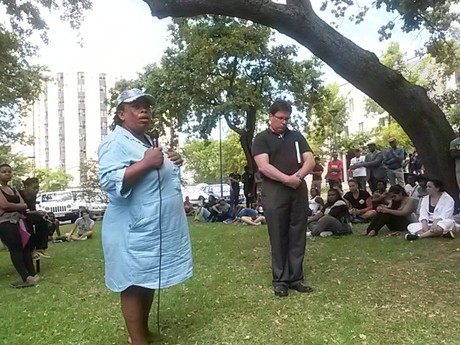UCT students and staff share stories of exclusion
Management promises staff contracts by the end of the week
About 100 University of Cape Town (UCT) students and workers gathered outside Graca Machel residence on Monday to complain about exclusion by the university.
“I suffer from depression because I don’t know if I will be able to afford my varsity fees this year,” said second year student Zola Shokane.
She was one of several students who spoke at the meeting set up by UCT’s Rhodes Must Fall collective.
“I was raised in a middle class household because my father is a doctor. Now, he left my mom and my three other siblings. We are living from paycheck to paycheck and it’s hard. When I moved into residence last year, the initial payment was R21,000.
“I have just been accepted academically, but I don’t know if I will be financially excluded because of the high fees,” Shokane said.
Last week, UCT implemented a plan that allows students who are eligible for the National Student Financial Aid Scheme to convert their debt into a NSFAS loan. This means that these students can register for 2016.
Ziggy Benoliel, who is chairman of the UCT for Disability Justice pleaded for lecturers and management to be “more sensitive” to students with disabilities.
He said he had missed his December politics exam and had had to write a supplementary paper. “When I asked the lecturer on duty for help, he was abrupt and insensitive. He was notified that part of my disability is that I have difficulty processing information the way other people can. I had to struggle through some of the questions on my own,” he said.
“I’m advocating for management and executives to be more sensitive to people with disabilities, especially us black students who may be financially disadvantaged as well,” he said.
Some workers who attended the gathering also voiced their concerns over salary disputes, overtime and the provision of uniforms.
On 28 October, UCT management signed an agreement with the National Education, Health and Allied Workers’ Union which commits the university to employ catering, transport, cleaning, security, and maintenance workers who work at UCT but are employed by outside companies.
The first workers are due to sign UCT employment contracts by June 2016.
Meanwhile, Jesina Moradeamunda, who works for catering company C3Foods, has been a casual worker at UCT since 2011. She said her requests to be made permanent had been dismissed.
“We as casuals don’t have safety shoes or a uniform to work in. We’ve been fighting for this since last year February. We do the same work as the permanent staff, but have not got an increase when they did. We have not been paid for the hours we worked last year and we have proof of this on our pay slips,” she said.
Moradeamunda said she was scared of being victimised for speaking out about their concerns.
“I’m afraid to speak about these things sometimes because I spoke during one of our last meetings and I was accused of influencing people and causing trouble,” she said.
Joyce Mbexe, who works as a cook for C3Foods, said: “I started on 7 January and I have still not been paid. I couldn’t buy my children all the things they needed for school because we don’t have money. I still have to come to work everyday, but my family is suffering.”
In response to the worker’s grievances, UCT operations manager Barry Daniel promised to look into the individual complaints.
“We are in the process of filling vacancies which we expect will be done by mid February. We are aware of the issue with staffing numbers and are working to address this,” he said.
“All staff will have their contracts by the end of the week. We have been taking sizes and will be providing uniforms by the end of the month. We pay our staff according to the hours they work, which may be slightly different to the previous contracts,” he said.
Daniel promised to have detailed responses at a meeting with staff on 15 February.
Support independent journalism
Donate using Payfast

Don't miss out on the latest news
We respect your privacy, and promise we won't spam you.
Next: Grants available for refugee organisations
Previous: Mbeki’s reputation is not in tatters because he was aloof
© 2016 GroundUp. 
This article is licensed under a Creative Commons Attribution-NoDerivatives 4.0 International License.

